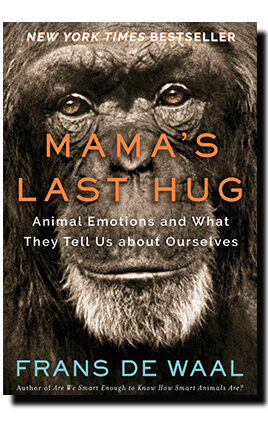Frans de Waal Received the 2020 PEN/E.O. Wilson Literary Science Writing Award for Mama’s Last Hug: Animal Emotions and What They Tell Us about Ourselves.


PEN American Center, the largest branch of the world’s leading literary and human rights organization, announced this week the winners and runners-up of the 2020 PEN Literary Awards, the most comprehensive literary awards program in the country. Among the awards is the PEN/E.O. Wilson Literary Science Writing Award, which celebrates writing that exemplifies literary excellence on the subject of physical and biological sciences. The winner receives a cash award of $10,000 and is honored at the PEN Literary Awards.
The 2020 PEN/E.O. Wilson Literary Science Writing Award Winner is:
Frans de Waal, Mama’s Last Hug: Animal Emotions and What They Tell Us about Ourselves (W. W. Norton & Company)
From the judges’ citation:
“It’s a great pleasure to award this year’s PEN/E.O. Wilson Literary Science Writing Award to preeminent primatologist, Frans de Waal, for his keenly observed, insightful, and wonderfully told exploration of the inner lives of animals, which highlights the bounty we share (and don’t share) with other species—both emotionally and psychologically. His lifelong study of primates, in the wild and in zoos, has led him to insights that are scientifically rigorous and not anthropomorphic, yet easy to understand in profoundly human terms. His elegantly written memoir, Mama’s Last Hug, is a book that reminds us that while our homo sapien life may seem very different from that of other animals, we inhabit a kingdom of neighbors.”
Judges for 2020:
Diane Ackerman is the author of 25 works of poetry and nonfiction, including three New York Times bestsellers: The Human Age (W.W. Norton & Company, 2015), which received the Henry David Thoreau Prize; A Natural History of the Senses (Vintage, 1991), which inspired a PBS NOVA series; and The Zookeeper’s Wife (W.W. Norton & Company, 2008), which received the Orion Book Award. Her essays have appeared in The New Yorker, Smithsonian, National Geographic, and elsewhere. She lives in Ithaca, N.Y., and has the unusual distinction of having a molecule named after her—dianeackerone—a sex pheromone in crocodilians.
Rivka Galchen is an award-winning fiction writer and journalist. She is a staff writer at The New Yorker and has also written for The New York Times Magazine, The London Review of Books, and other publications. She is the author of Atmospheric Disturbances (Farrar, Straus and Giroux, 2008), American Innovations (Farrar, Straus and Giroux, 2014) and Little Labors (New Directions, 2016).
Priyamvada Natarajan is the author of the critically acclaimed book Mapping the Heavens: The Radical Scientific Ideas that Reveal the Cosmos (Yale University Press, 2017). She is an astrophysicist and professor at Yale University, with a joint appointment in the Astronomy and Physics departments. She has made seminal contributions to our current understanding of the formation and growth of black holes and of the nature of dark matter. She is the recipient of numerous awards and honors, including a Guggenheim Fellowship for Natural Sciences and a Radcliffe Fellowship at Harvard’s Radcliffe Institute for Advanced Study.
The PEN/E.O. Wilson Literary Science Writing Award was founded by scientist and author Dr. Edward O. Wilson, activist and actor Harrison Ford, and the E.O. Wilson Biodiversity Foundation. The award is also supported by James and Cathy Stone. The inaugural award was conferred in 2011.
Examples of published works that exemplify the quality of writing the award is designed to acknowledge include Rachel Carlson’s Silent Spring (1962), Dr. James Watson’s The Double Helix (1969), Lewis Thomas’s The Lives of a Cell (1978), and Douglas Hofstadter’s Godel, Escher, Bach: An Eternal Golden Braid (1979).
More about the Book:
Primatologist Frans de Waal explores the fascinating world of animal and human emotions.
Frans de Waal has spent four decades at the forefront of animal research. Following up on the best-selling Are We Smart Enough to Know How Smart Animals Are?, which investigated animal intelligence, Mama’s Last Hug delivers a fascinating exploration of the rich emotional lives of animals.
Mama’s Last Hug begins with the death of Mama, a chimpanzee matriarch who formed a deep bond with biologist Jan van Hooff. When Mama was dying, van Hooff took the unusual step of visiting her in her night cage for a last hug. Their goodbyes were filmed and went viral. Millions of people were deeply moved by the way Mama embraced the professor, welcoming him with a big smile while reassuring him by patting his neck, in a gesture often considered typically human but that is in fact common to all primates. This story and others like it form the core of de Waal’s argument, showing that humans are not the only species with the capacity for love, hate, fear, shame, guilt, joy, disgust, and empathy.
De Waal discusses facial expressions, the emotions behind human politics, the illusion of free will, animal sentience, and, of course, Mama’s life and death. The message is one of continuity between us and other species, such as the radical proposal that emotions are like organs: we don’t have a single organ that other animals don’t have, and the same is true for our emotions. Mama’s Last Hug opens our hearts and minds to the many ways in which humans and other animals are connected, transforming how we view the living world around us.
Praise for the Book:
Through colorful stories and riveting prose, de Waal firmly puts to rest the stubborn notion that humans alone in the animal kingdom experience a broad array of emotions….De Waal contributes immensely to an ethical sea change for animals.
— Barbara J. King
De Waal’s eye-opening observations argue for better treatment and greater appreciation of animals, even as he ensures that you’ll never look at them—or yourself—the same way again.
Game-changing….For too long, emotion has been cognitive researchers’ third rail….But nothing could be more essential to understanding how people and animals behave. By examining emotions in both, this book puts these most vivid of mental experiences in evolutionary context, revealing how their richness, power and utility stretch across species and back into deep time….The book succeeds most brilliantly in the stories de Waal relates.
— Sy Montgomery
An original thinker, [de Waal] seems to invite us to his front-row seats, sharing the popcorn as he gets us up to speed on the plot of how life works, through deeply affecting stories of primates and other animals, all dramas with great lessons for our own species.
— Vicki Constantine Croke
De Waal’s conversational writing is at times moving, often funny and almost always eye-opening….It’s hard to walk away from Mama’s Last Hug without a deeper understanding of our fellow animals and our own emotions.
— Erin Wayman
A captivating and big-hearted book, full of compassion and brimming with insights about the lives of animals, including human ones.
— Yuval Noah Harari, New York Times best-selling author of Sapiens: A Brief History of Humankind
Before I realized Frans de Waal’s connection to Mama’s actual last hug, I sent the online video link to a large group of scientists saying, ‘I believe it is possible to view this interaction and be changed forever.’ Likewise, I believe that anyone reading this book will be changed forever. De Waal has spent so many decades watching intently and thinking deeply that he sees a planet that is deeper and more beautiful than almost anyone realizes. In these pages, you can acquire and share his beautiful, shockingly insightful view of life on Earth.
— Carl Safina, author of Beyond Words: What Animals Think and Feel
I doubt that I’ve ever read a book as good as Mama’s Last Hug, because it presents in irrefutable scientific detail the very important fact that animals do have these emotions as well as the other mental features we once attributed only to people. Not only is the book exceedingly important, it’s also fun to read, a real page-turner. I can’t say enough good things about it except it’s utterly splendid.
— Elizabeth Marshall Thomas
Frans de Waal is one of the most influential primatologists to ever walk the earth, changing the way we think of human nature by exploring its continuity with other species. He does this again in the wonderful Mama’s Last Hug, an examination of the continuum between emotion in humans and other animals. This subject is rife with groundless speculation, ideology, and badly misplaced folk intuition, and de Waal ably navigates it with deep insight, showing the ways in which our emotional lives are shared with other primates. This is an important book, wise and accessible.
— Robert Sapolsky, author of Behave: The Biology of Humans at Our Best and Worst
In Mama’s Last Hug, Frans de Waal marshals his wealth of knowledge and experience, toggling expertly between rigorous science and captivating anecdote to explain animal behavior—humans included. While doing so, he rebukes the common conceit that we are necessarily better, or smarter, than our closest relatives.
— Jonathan Balcombe, author of What a Fish Knows
Conscience: The Origins of Moral Intuition, Patricia S. Churchland (W. W. Norton & Company)
Mama’s Last Hug: Animal Emotions and What They Tell Us about Ourselves, Frans de Waal (W. W. Norton & Company)
On the Backs of Tortoises: Darwin, the Galapagos, and the Fate of an Evolutionary Eden, Elizabeth Hennessy (Yale University Press)
The End of Ice: Bearing Witness and Finding Meaning in the Path of Climate Disruption, Dahr Jamail (New Press)
Losing Earth: A Recent History, Nathaniel Rich (Farrar, Straus and Giroux)
The Body: A Guide for Occupants, Bill Bryson (Doubleday)
Conscience: The Origins of Moral Intuition, Patricia S. Churchland (W. W. Norton & Company)
Mama’s Last Hug: Animal Emotions and What They Tell Us about Ourselves, Frans de Waal (W. W. Norton & Company)
Rethinking Consciousness: A Scientific Theory of Subjective Experience, Michael S. A. Graziano (W. W. Norton & Company)
On the Backs of Tortoises: Darwin, the Galapagos, and the Fate of an Evolutionary Eden, Elizabeth Hennessy (Yale University Press)
The End of Ice: Bearing Witness and Finding Meaning in the Path of Climate Disruption, Dahr Jamail (New Press)
The Deep History of Ourselves: The Four-Billion-Year Story of How We Got Conscious Brains, Joseph LeDoux (Viking)
Hot Carbon: Carbon 14 and a Revolution in Science, John F. Marra (Columbia University Press)
Losing Earth: A Recent History, Nathaniel Rich (Farrar, Straus and Giroux)
The Uninhabitable Earth: Life After Warming, David Wallace-Wells (David Wallace-Wells)
Past winners: Siddhartha Mukherjee, James Gleick, Leonard Mlodinow, Carl Hart, Joshua Horwitz, Lauren Redniss, Lindsey Fitzharris, and Ben Goldfarb.
Press Coverage

